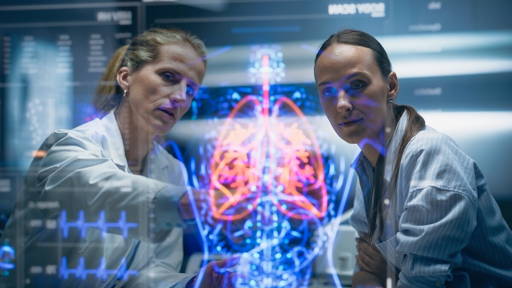At Memorial Sloan Kettering Cancer Center (MSK), artificial intelligence (AI) is reshaping the way doctors plan and deliver radiation therapy. Where every millimeter can mean the difference between destroying cancer cells and harming healthy tissue, AI now helps clinicians target tumors with unprecedented accuracy.
Harini Veeraraghavan, Ph.D., leads the development of AI models designed to account for the natural movement and shifting of organs during treatment. “Breathing, digestion, even water flow can change how organs move,” she explains. Her team is creating a digital twin that models these dynamics, ensuring radiation is delivered exactly where it is needed.
Visible impact
The impact is already visible. AI-generated organ contours provide a starting point for radiation oncologists, replacing hours of manual tracing on CT and MRI scans. “It’s like having your best resident on the case,” says Nancy Lee, MD, Chief of Head and Neck Radiation Oncology. The result: treatments that are faster, more consistent, and more precise.
Beyond targeting, MSK researchers are also using AI to track how tumors respond during therapy. Traditional methods like RECIST measure tumors in two dimensions. MSK’s AI models instead analyze volume in 3D, offering a fuller picture of growth or shrinkage. This enables oncologists to detect early if a tumor stops responding, weeks earlier than standard practice, and adapt treatment accordingly.
AI is also helping identify tumor hypoxia (areas with low oxygen that are often resistant to therapy) using standard PET scans, eliminating the need for more complex imaging. By mapping these resistant regions, clinicians can adjust doses or modify therapy while reducing side effects. “Traditionally, we might wait months to confirm whether treatment is effective,” says Puneeth Iyengar, MD, Ph.D. “With AI, we can make those judgments much earlier.”
More than 40 cancer types
The technology is already applied across more than 40 cancer types at MSK, including head and neck, lung, pancreatic, and prostate cancers. Each day, hundreds of patients benefit from AI-assisted planning, demonstrating how advanced algorithms are becoming integral to real-world care.
As research continues, MSK is working with partner institutions to expand AI-driven tools into even more treatment areas. For patients, this translates into more personalized therapy, fewer side effects, and potentially better survival outcomes. Dr. Lee emphasizes the collaborative nature of these advances: “These breakthroughs come from teamwork. Clinicians, physicists, and AI experts working side by side. Together, we’re building the future of precision cancer care.”
With AI as a trusted partner in the clinic, radiation therapy is becoming not only more accurate but also more adaptable, offering patients safer, more effective treatments when they need them most.
Transforming radiotherapy with AI
At Leiden University Medical Center (LUMC), AI is transforming radiotherapy for oral cavity cancer by making treatment planning faster, more precise, and less damaging to healthy tissue. Traditionally, creating radiation plans was a time-consuming process, often taking up to eight hours. Now, AI generates proposals based on thousands of previous cases worldwide. Lab technicians review and refine these plans, reducing preparation time to just one or two hours.
AI also speeds up the outlining of organs on CT scans, halving the time required for this critical step. Tumors are still drawn manually, but AI’s accuracy significantly streamlines the process. More precise dose distribution reduces radiation to vital structures such as swallowing muscles and salivary glands, lowering the risk of side effects like swallowing difficulties. The technology also supports adaptive radiotherapy, where daily CT scans allow adjustments during treatment. This innovation not only improves workflow but also enhances patients’ quality of life.







